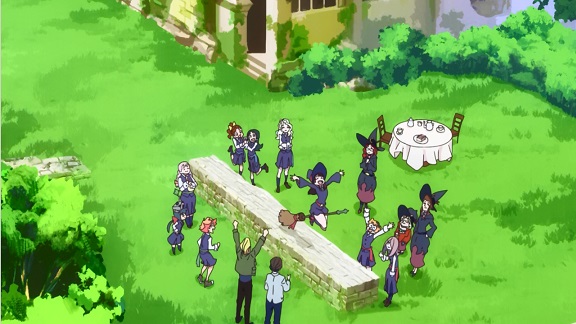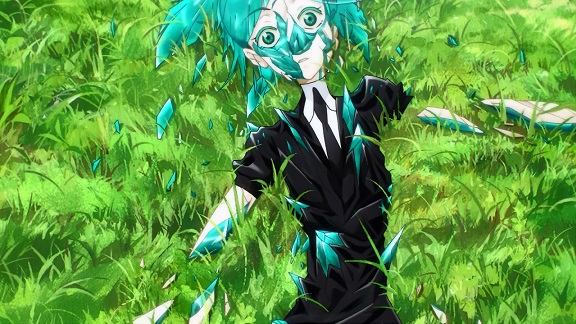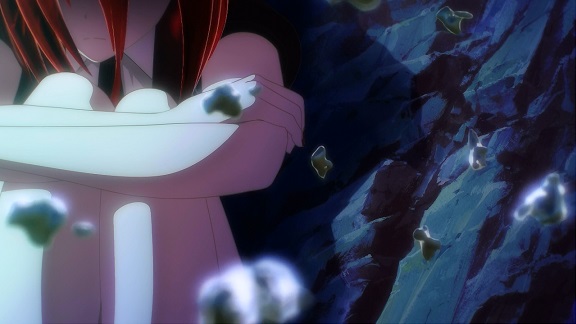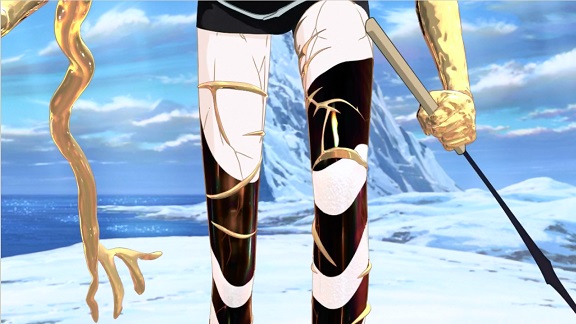A protagonist who doesn’t let their innate weakness and lack of talent stand in the way of their greatest wish, who doesn’t give up when everybody tells them their dream is foolish: Hoseki no Kuni‘s Phosphophyllite really is a lot like Little Witch Academia‘s Akko, even if they are a genderless gem person. But Phos is Akko seen through a dark mirror, with the latter’s strengths becoming liabilities in Phos’ world.

With Akko, the greatest criticism of her character was always that her headstrong and impulsive nature, remaining mostly unchanged throughout Little Witch Academia, should’ve gotten her in bigger problems than it did. LWA‘s world was forgiving enough that she could usually get herself out of the trouble she got herself into — if with a little help from her friends — and usually without lasting consequences. Akko’s best strength is that same headstrongness and boundless enthusiasm, keeping going through failure after failure until she reaches her goal.

Phos shares that same impulsiveness with Akko and that same longing to become something they really aren’t suited for, but where Phos differs from Akko is that they have already mostly given up on it. Phos wants to be a warrior like her fellow gems, fighting off the Lunerians who want to kidnap the gem people to make them into jewelry or something. But as events in the very first episode make clear, they are wholly unsuitable for it, shattering just from hearing Kongo sensei’s battle cry. Phos is idle and drifting through life, with little desire to do anything if they can’t fight.

That changes when Phos meets Cinnabar, who is in a self imposed exile because their very presence can poison the other gems: any part of a gem that comes into contact with it loses its ability to transmit light and has to be chipped off. And because a gem’s memories are stored in their bodies, they loses any memories stored in those parts as well. That’s why Cinnabar patrols alone at night, but when they save Phos, the latter decides to rescue them from this exile, finding a job for them to do safely with the other gems.

This sets Phos up on the same sort of self improvement journey that Akko goes on in Little Witch Academia, but for Phos there are much greater costs to pay. Phos gets stronger, faster legs, but at the cost of their original ones and the memories they held. Then, as they stays awake during winter with their new friend Antarcticite, Phoa loses their arms, which were too weak to hold a sword. Getting new arms takes an infusion of platinum and gold alloy, but getting them leads to Antarcticite being kidnapped by the Lunerians. As the other gems awake from their winter sleep, what they encounter is a new Phos, one with Antarcticite’s haircut and powers resembling that of Cinnabar, but without much of their memories or personality.
Incidently, the way that gold/platinum alloy fills the cracks in Phos’ original body is reminiscint of how broken pottery is repaired in Japanese Buddhist tradition. TBuddhist influences are everywhere in Hoseki no Kuni, as explained here: in this context you could argue that Phos’ attempt to grow stronger at all cost is foolhardy or even wrong as it leads to more suffering. It would’ve been better had they remained the same person they were at the start of the series, rather than live up to an unattainable ideal.
Comparing Phos to Akko, the latter never had to deal with this sort of side effects to her quest to grow stronger until very late, and even then it was active interference by the Big Bad of the series that caused it. Being Phos on the other hand is suffering, both for Phos themselves and their fellow gems. Each attempt by Phos to grow stronger leads to some loss on their part and that loss is not limited to just Phos themselves, as Antarcticite found out. Perhaps that’s the difference between a western oriented series like LWA and one with such a Buddhist influence where perhaps the desire to grow strong in itself is wrongheaded.
This is the Sixth post in this year’s twelve days of anime challenge. Tomorrow Today: how the ugliest, lowest budget series of the year turned out to be one of the best and how corporate interests fucked it over.
No Comments